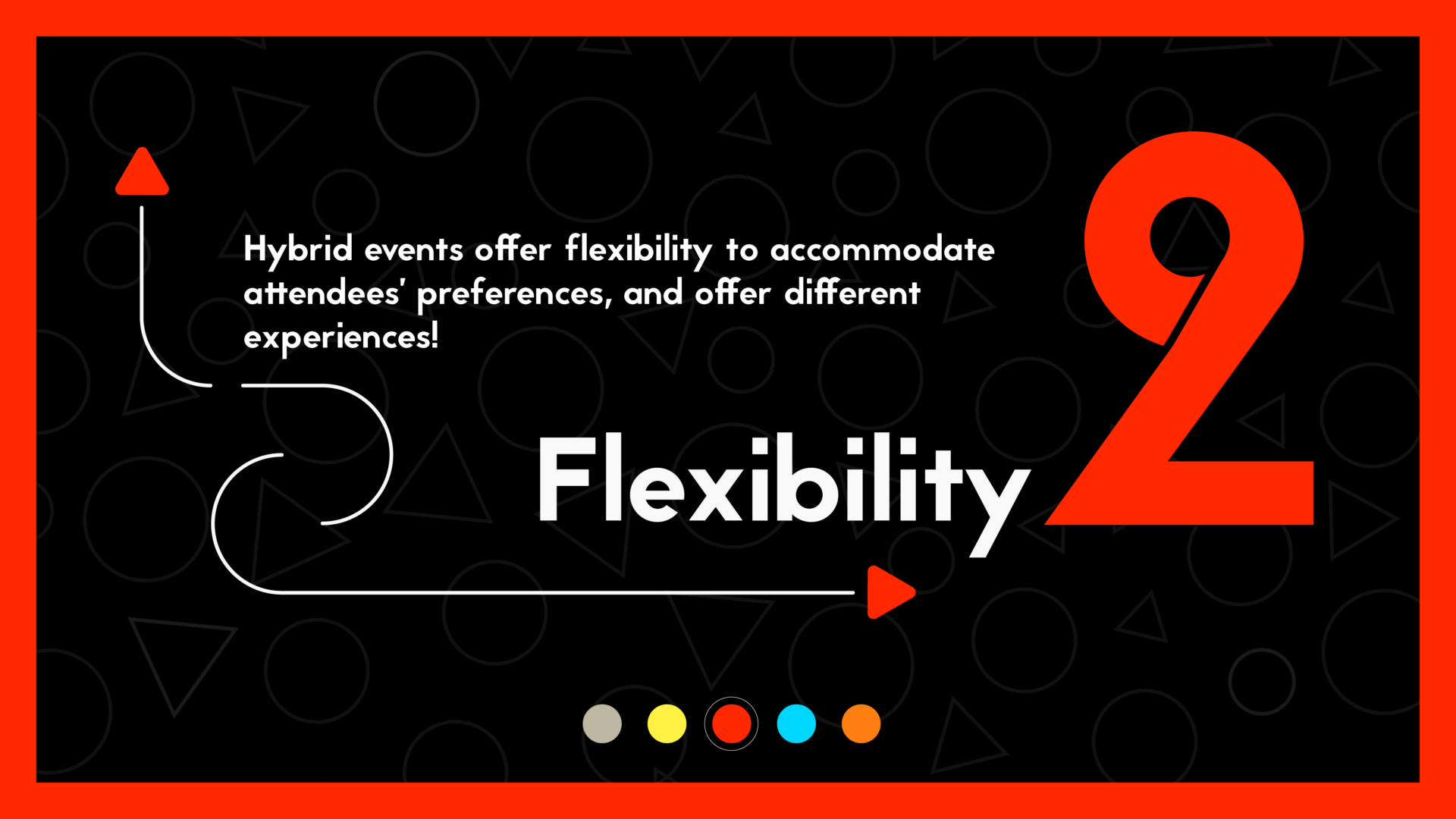In today’s ever changing digital landscape, hybrid events have blurred the lines between traditional in-person gatherings and virtual experiences. The way we network and learn has gone through a profound transformation.
And that digital transformation has ushered in endless possibilities. Imagine a gathering where attendees from around the globe can participate seamlessly alongside those in a physical venue.
A hybrid event is precisely that – a dynamic blend of in-person and virtual experiences designed to engage a diverse audience, harness the power of digital technology, and adapt to the ever-changing demands of our modern world. The result? An inclusive experience that can cater to a global audience.
Now that you understand what it is, you’re probably wondering why you should opt for hybrid events.
In this article, we will not only demystify the concept of hybrid events but also guide you through the process of hosting one successfully, allowing you to open your doors to a wider audience and endless possibilities in event marketing.
Why Hybrid Events?
Hybrid events have become a compelling choice for several reasons. From expanding your reach to embracing flexibility, here are a few more reasons why hybrid events are becoming increasingly popular for event organizers around the world.
1. Expanded Reach

One of the biggest advantages of hosting a hybrid event is its reach. You’re no longer confined to your geographical location. By incorporating virtual components, you can extend your event’s reach beyond the physical venue, allowing participants from around the world to join.
This not only impacts your events attendance but also enhances engagement, as participants can decide how best to interact with the event based on their preferences and availability.
2. Flexibility

Hybrid events offer flexibility to accommodate attendees’ preferences, whether they prefer to attend in person or virtually, making it easier to cater to diverse audiences. Recording the event also lets you distribute content and advertise for the next event.
3. Resilience

In an unpredictable world, hybrid events provide a level of resilience. You can adapt to changing circumstances, such as travel restrictions or health concerns, by seamlessly pivoting between in-person and virtual formats. If any problems arise with the technology or venue, you can still have an active audience.
4. Data and Analytics

Hybrid events provide valuable data and analytics on attendee engagement, interactions, and preferences, helping you refine future events. You get virtual, and in-person feedback, giving you every perspective possible, offering you a solid opportunity to improve.
5. Cost-Efficiency
Let’s face it, the cost of hosting an in-person event and even attending one can be expensive. Costs associated with venue rental, travel, and accommodation can add up very quickly. A hybrid event can help reduce some of these overheads.
How to Host a Hybrid Event
Now that you understand the significance of hybrid events, here’s a step by step guide on how you can host one successfully.
1. Define Your Goals
Start by setting clear objectives for your event. What do you want to achieve? Whether it’s brand exposure, lead generation, or knowledge sharing, your goals will guide your event planning.
And don’t forget, your goals should be specific, measurable, achievable, relevant, and time-bound (SMART).
2. Choose the Right Technology
Select a reliable event platform or software that supports both in-person and virtual experiences. Ensure it offers features like live streaming, interactive sessions, and audience engagement tools.
Invest in microphones and lighting so that the online experience matches the in-person event. And don’t forget to test your chosen technology.
Remember you want things to go off without a hitch and to be interesting at the same time. Quality platforms will assist. By investing in a proper platform, you’re bound to meet and exceed participants’ expectations.
3. Create Engaging Content
Now that you’ve invested your time and effort in finalizing the right technology, the next step is to ensure you can captivate your audience’s attention. And how do you do that? Through content, of course!
Plan engaging content and experiences that cater to both virtual and in-person attendees. Ask yourself, ‘What are the interests and needs of my target audience?’ Your content should revolve around the answers you come up with.
Remember, when hosting a hybrid event, you have an online audience too. It may be easy for your audience to lose interest at times when you’re not in person or they feel that the content isn’t engaging or interactive.
As a solution, consider live streaming keynotes, interactive Q&A sessions, and networking opportunities for virtual participants.
4. Seamless Registration
In today’s digital age, you want to give your audience the option to choose between in-person or online, and you want this process to be a breeze.
Implement a user-friendly registration process that allows attendees to choose between in-person and virtual attendance. And don’t forget, plans change. Allow the attendees to switch between in-person and virtual as they see fit.
5. Technical Rehearsals
Conduct technical rehearsals to iron out any glitches and ensure a smooth experience for both audiences. Test audio, video, and connectivity to prevent technical hiccups.
The goal of these rehearsals is to ensure you avoid technical hiccups that turn your event into a virtual or in-person mess.
6. Content Distribution
After the event, make event content available on-demand for virtual attendees. This extends the value of the event beyond the live sessions.
Not to mention the advertising opportunities. You can continue to update content, offer new resources, and promote upcoming events. Some event hosts even charge a premium to access recorded content. Consider whether doing so may make sense for your audience.
Think of on-demand content as a way to stay in touch well after your event is over.
7. Gather Feedback
Gathering feedback is a way for you to understand what your attendees liked, what could’ve been better and what worked really well. This feedback is important as it will allow you to make your next event even more successful.
Not to mention it shows that you’re listening and willing to make changes to ensure a better experience for your next event. So, reach out to all those that attended, and maybe even those that did not, and collect feedback to gauge experience and identify areas for improvement.
Conclusion
Hybrid events offer a versatile and forward-thinking approach to event hosting, allowing you to engage a wider and more diverse audience. By understanding why hybrid events matter and by following our practical steps on how to host them, you’ll be well-prepared to plan and execute a successful event that bridges the gap between in-person and virtual worlds.
Start planning your next hybrid event today and unlock a world of possibilities in event marketing and engagement.
Interested in hosting a hybrid event, or video production in general? Learn more about Bottle Rocket Media’s event video production services as well as other services like motion graphics services, connect with us to start your video project.


